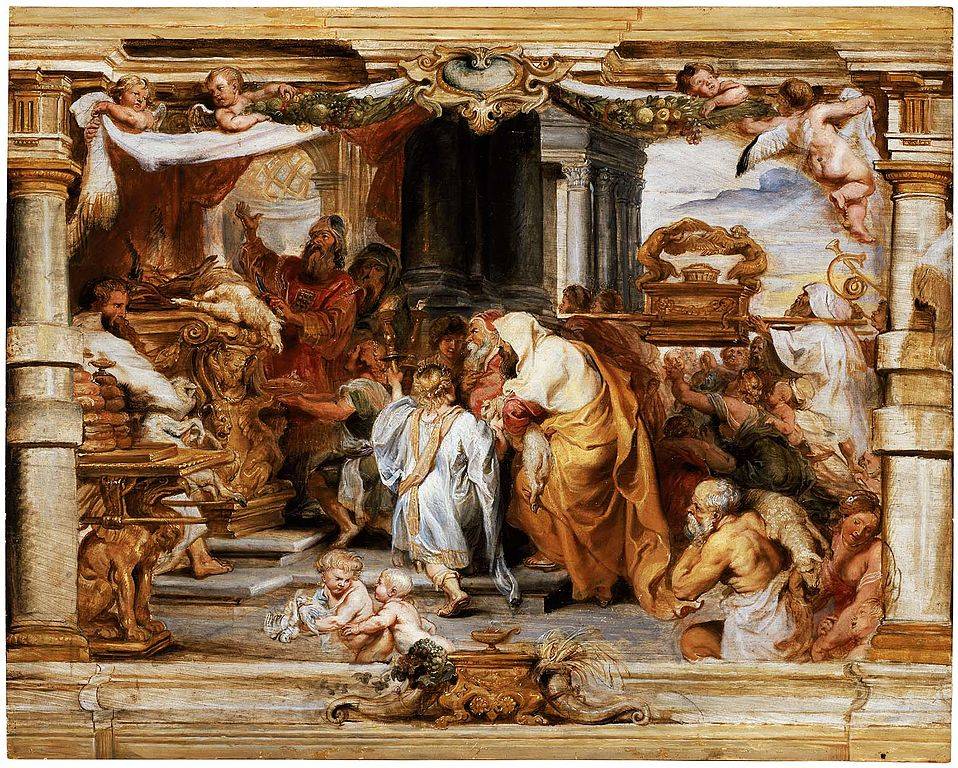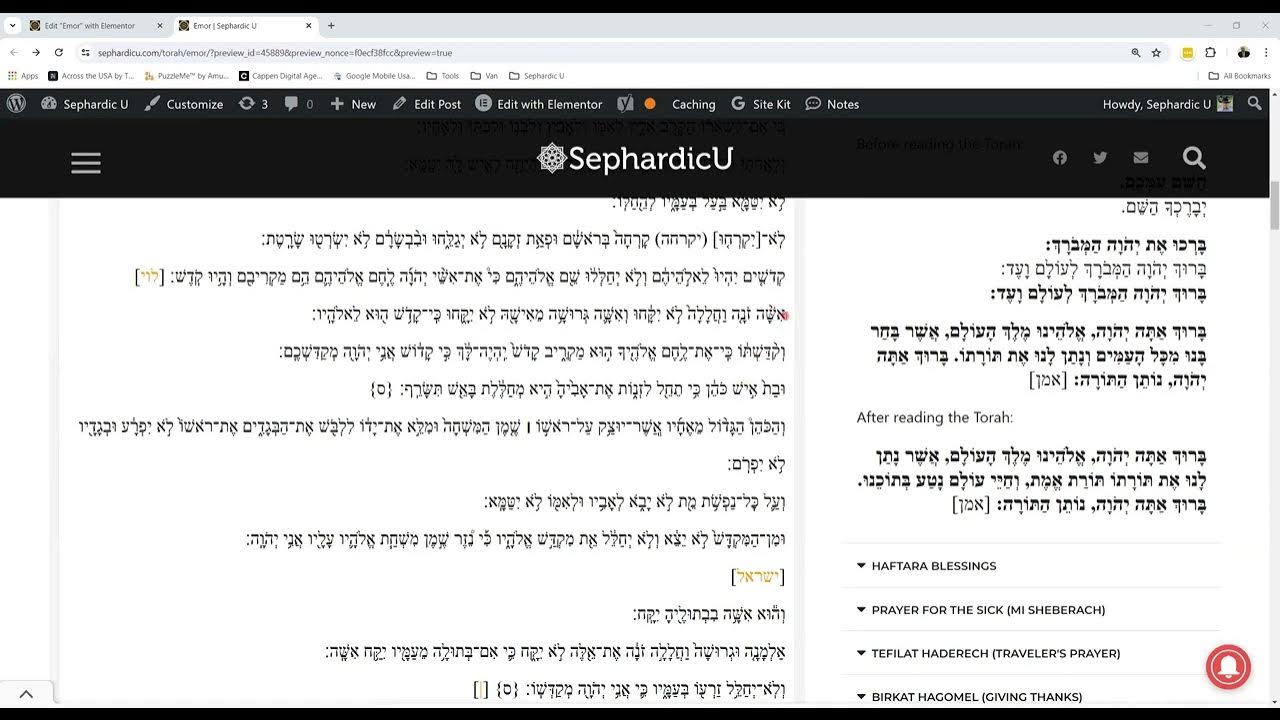
A Just Society
The Book of Leviticus is sometimes perceived as a catalog of sacrifices with detailed lists of animals, substances, and dates. These details are misleading. The true purpose of the lists of sacrifices is to guarantee the creation of a just society.
The sacrifices can be divided into two clearly distinct groups. They are offered in positive or negative circumstances. The list in the first chapters of VaYikra starts with the positive and moves to the negative in a descending order.
Positive Sacrifices
Ascent
The עולה, ascent-offering, is offered by a person of high spiritual level. There is no sin or transgression, no thanksgiving or personal celebration, just a burning desire to be close to the Creator.
Thanksgiving
The second category, תודה, is of sacrifices offered in gratitude by the recipient of a Divine favor. It might be offered by one who was saved from a great disaster or one who is simply enjoying blessing and prosperity. Showing gratitude is not easy, because it acknowledges debt or even weakness. But even with that reservation, this sacrifice is brought when one is in a positive mood.
Peace-Offering
The third category, שלמים, is of sacrifices which are brought as part of a personal or communal celebration. The Hebrew name connotes wholesomeness, completion, and peace. Relatives and friends are invited to partake in the meal and some of the meat is given to the Cohanim. The shared meal creates a spirit of friendship and unity.
Past, Present, and Future
These sacrifices can also be seen as celebrating past, present, and future. Thanksgiving is an acknowledgement of the past, peace-offering celebrates the moment, and the ascent-offering shows the aspiration for future spiritual growth.
Negative Sacrifices
Sin-Offering
The first category in this group is חטאת, sin-offering. It is brought for an unintentional transgression of a prohibition. The Hebrew term means to miss or to be off the mark, and it is a lesser degree of sin. Within this category there is a descending order of sinners. First, the High Priest, the whole nation, and the chieftains are mentioned, to show that no one is above making mistakes. Then, the Torah speaks of the transgression of individuals.
Penalty-Offering
The next category is penalty-offering brought for forgetfulness. It could be one who forgot a crime he witnessed and therefore caused the acquittal of the criminal. Another case is of one who forgot that he is impure and entered the Temple in a state of impurity. In these and similar cases one is held responsible and is called guilty because he should have been more aware of his actions and whereabouts.
Misuse of Holiness
The third category is a penalty for misuse of the Temple’s property. In addition to the sacrifice, the sinner must repay the theft and add one fifth of it as a fine. The term describing the sin – מעילה, is derived from the Hebrew word for treason. This is a deliberate offense which shows carelessness and dishonesty.
The Bottom Rung
We have now arrived at the last section dealing with sacrifices (5:20-26), in which the Torah will discuss the worst sins. We have gone down the spiritual ladder and met the devout, the grateful, the joyous, the accidental sinner, the criminally negligent, and the penalized sinner. We are curious to know who is at the bottom rung. Here is what the Torah says:
When a soul sins and betrays God; if a man denies he has received a collateral or a loan, or if he robbed or defrauded another person, or if he has found a lost object and did not return it to its rightful owner. He is guilty of that sin. He must pay damages with a one-fifth fine, and he must bring a penalty-offering.
The descending order leading to this paragraph sends the message that God does not need sacrifices or rituals. Our goal is to create a just and altruistic society, and to treat each other with honesty and dignity.
That is why the monetary offender is punished most harshly. He must repay the victim and add a fine, but that’s not all. God Himself is enraged with him and he has to bring a penalty offering to appease God. Unlike the previous case, which is described as a misuse of sacred property – מעל בקדשי יי, the offense against another human is called a betrayal of God Himself – מעל ביי.
A Just Society
It turns out that the devotional system of sacrifices is only the means for cultivating personal growth. That growth stems from a heightened spiritual awareness and a reverence of God. We are naturally selfish and self-absorbed, and those concepts teach us to be more sensitive and caring for the needs of others. The first step is avoiding the negative tendencies of harming, embezzling, and defrauding others.
Social psychologist Jonathan Haidt argues in The Righteous Mind that moral principles anchored in religious beliefs are essential for a healthy society. They are especially helpful in overcoming the problem of freeloading, which can undermine the financial stability of a society. He views religion as a practical evolutionary development, and states:
Creating gods who can see everything, and who hate cheaters and oath-breakers, turns out to be a good way to reduce cheating and oath-breaking. (p.297)
As a believer, I gladly embrace this statement, because it means that God has delivered to us, through the Torah, the same message He has delivered to all of humanity through the language of the genetic code.
Questions for Kids: Parashat VaYikra
What is the root of the word וַיִּקְרָא?
Why did God have to call מֹשֶׁה?
What is the root of the word קָרְבָּן?
What is the message of that word?
Today what do we have instead of the קָרְבָּנוֹת?
Who was in charge of the קָרְבָּנוֹת?
Who is in charge of the תְּפִלּוֹת?
The קָרְבָּנוֹת were offered for three main reasons. What are they?
Which three words in Hebrew can describe these three reasons?
How many תְּפִלּוֹת are there daily?
What are the names of these תְּפִלּוֹת?
Which of these names is also the name of a קָרְבָּן?
What is the meaning of this word?
At the end of the Parasha we read about a קָרְבָּן which a person must bring for very serious sins. What are these sins?
What do we learn from that?
Answers to Questions for Kids
- קָרָא – to call.
- Because the Mishkan was filled with קְדֻשָּׁה and משה could not come in if he were not invited.
- קרב/קָרוֹב.
- That the קָרְבָּנוֹת bring us closer to ה’.
- תְּפִלּוֹת.
- The כֹּהֲנִים.
- Each of us, and we are guided by the rabbis and teachers.
- To thank ה’, ask for forgiveness, and ask for our needs.
- תּוֹדָה, סְלִיחָה, בְּבַקָּשָׁה.
- Three.
- שַׁחֲרִית, מִנְחָה, וְעַרְבִית.
- מנחה.
- A gift.
- Stealing from another person or cheating another person.
- That the Torah wants to teach us to be nice to one another and respect one another.








Parashat Behar – Weekday Torah Reading (Moroccan TeAmim)